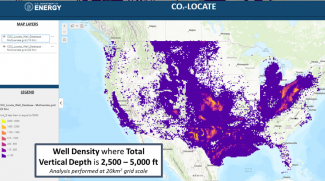Creating a net-zero carbon emissions power sector and economy is an immense endeavor that requires a host of intricate technologies and applications, and the CO2-Locate database is a centralized platform that allows users to quickly and accurately obtain the data they need. Now published on the Energy Data eXchange® (EDX), CO2-Locate is one of several innovative products developed with funding from the Bipartisan Infrastructure Law.
Safe and effective geologic carbon capture and storage (CCS) requires data to inform commercial and regulatory decisions. A key element of subsurface storage are wellbores used to obtain information about the prospective subsurface storage reservoir, for use to inject CO2 into a target reservoir, as well as wells for long-term monitoring to assess and ensure long-term permanence of subsurface stored CO2.
Globally, there are over six million wells that have been drilled for research and resource purposes, many reaching thousands of feet into the subsurface. Information and data about these wells pose a significant opportunity to inform and assist the carbon storage commercial and regulatory communities. Information about these wells largely has focused on their form and history in relation to their primary purpose, most of which originated as energy extraction and production related infrastructure.
Some of this primary data is relevant to the CCS community but streamlining and enhancing this information to provide insights and features of most relevance to CCS stakeholders can require advanced data management and analytical steps. CO2-Locate aims to solve this challenge by providing a national well database through the acquisition and integration of data from class II (oil and gas) wells across the country to help inform class VI (CCS) needs.
Designed to support more efficient and effective CCS site selection, risk analysis and other key stakeholders needs, CO2-Locate includes the start of an integrated national well dataset, representing open-source wellbore data from disparate state and federal entities.
Leveraging scripts to regularly pull and update data from all sources, this dynamic database also provides summary spatio-temporal statistics and offers data-driven insights into potential opportunities and risks while delivering beneficial insights through an intuitive web map. Leveraging existing NETL research and development technologies, CO2-Locate’s high-level analytics will give researchers a better understanding of the age, total vertical depth and status of wells across the country, allowing them to make informed site selection decisions.
“As a dynamic database, CO2-Locate will support future automatic updates, capturing changes among data and new data from the original disparate sources. This means users will always have access to the most current information,” said NETL’s Jennifer Bauer, the project’s principal investigator and member of NETL’s Science-based Artificial Intelligence and Machine Learning Institute (SAMI). As data are the energy that drive AI-innovations, “smart” data systems like CO2-Locate not only leverage AI-logic to support their development but help drive future AI-informed innovations and insights by users.
“The schema under development to support custom acquisition, processing and integration – pulling data from the original resources and transforming and integrating them into CO2-Locate at the touch of a button. Additionally, CO2-Locate can also serve as a framework for associating other relevant data and information to these records, such as field observations on wellbore conditions, to provide access to robust information needed to support all stages of CCS activities.”
By using CO2-Locate, project managers, researchers, industry and stakeholders can have access to a plethora of data that might reduce risk and uncertainties while saving time and helping to reduce costs, making projects feasible that might otherwise be prohibitively expensive or difficult. The development of CO2-Locate and EDX itself are examples of how the scientists and engineers at NETL are exploring avenues to address the nation’s greatest energy, economic and environmental challenges to build a sustainable future for all Americans.
NETL is a U.S. Department of Energy national laboratory that drives innovation and delivers technological solutions for an environmentally sustainable and prosperous energy future. By leveraging its world-class talent and research facilities, NETL is ensuring affordable, abundant and reliable energy that drives a robust economy and national security, while developing technologies to manage carbon across the full life cycle, enabling environmental sustainability for all Americans.




